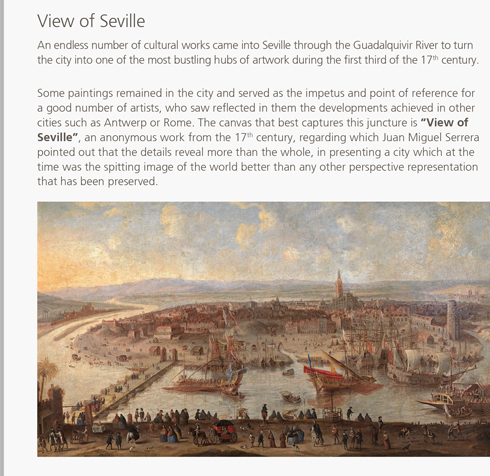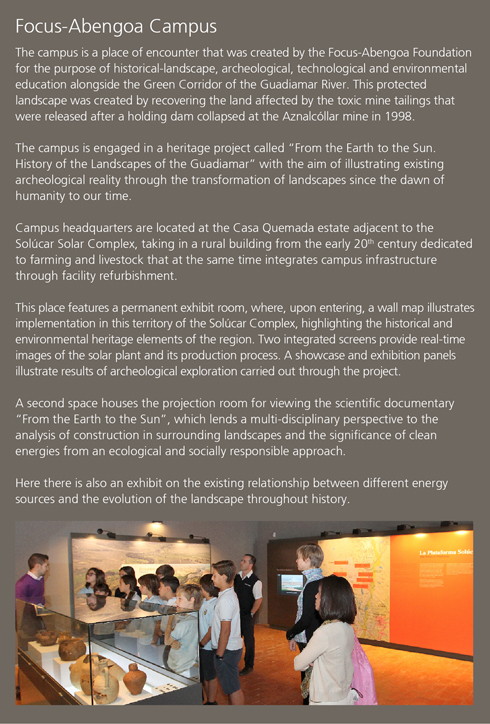 Abengoa
Abengoa
Annual Report 2011
- Corporate Social Responsibility
- People
- The Community
- Education, research, and dissemination of knowledge
Diego Velázquez Research Center
The creation of the Diego Velázquez Research Center came about as the result of the acquisition in 2007 of Velázquez’s canvas titled “Santa Rufina” by the Focus-Abengoa Foundation for the city of Seville.
This facility addresses the need for a place of research, dissemination and reflection concerning the beginnings and consequences of the Sevillian painter’s works.
The collection includes three paintings from Velázquez’s Sevillian period: “Santa Rufina”, “The Imposition of the Chasuble on San Ildefonso”, and “Immaculate Conception”, as well as works by Francisco Pacheco, Herrera el Viejo, Martínez Montañés, Cavarozzi, Zurbarán and Murillo.

Prize for the best doctoral thesis on a Sevillian theme
The prize was awarded to Dr. Clara Bejarano Pellicer for “Music and Musicians in Seville under the Reign of the Habsburgs”, constituting an original and innovative contribution to the historiography of the Modern Age in approaching a little known topic.
International Alfonso E. Pérez Sánchez Award
In this year’s third edition of the International Alfonso E. Pérez Sánchez Award created by the Focus-Abengoa Foundation to stimulate scientific studies related to art, history, culture, literature and aesthetics during Velázquez’s century, the panel of judges decided not to award the prize in that sufficient eligibility requirements had not been met.
8th Javier Benjumea Puigcerver Research Award
The Social Council of the University of Seville and the Focus-Abengoa Foundation awarded the “8th Javier Benjumea Puigcerver Research Award” to Antonio Gómez Expósito, professor of electrical engineering and director of the Electrical Engineering Department of the University of Seville, for his work titled “Estimating multi-level status: a new paradigm for networks in the 21st century”.
Alfonso E. Pérez Sánchez Legacy Endowment
In 2011, the Focus-Abengoa Foundation was presented with the Alfonso E. Pérez Sánchez Legacy Endowment from the honoree’s legal heirs, Francisco Rocha Nicolás and Benito Navarrete Prieto. Prof. Pérez Sánchez was a key director of the Prado National Museum (1983 – 1991) and artistic advisor to the Foundation.
This Legacy Endowment, as the result of its thematic singularity, focusing on the study of Spanish and Italian Baroque painting and drawing, constitutes Spain’s most important text and photographic Art History library. It comprises essentially monographs on Spanish, Italian and European artists from the 14th to the 20th century
The collection is presently found at Foundation headquarters, the Hospital de los Venerables in Seville, and will eventually serve as an international center dedicated to the Baroque and Velázquez’s Sevillian period.
Focus-Abengoa Foundation schools
In November, the Focus-Abengoa Foundation, in collaboration with Menéndez Pelayo International University (UIMP), inaugurated the 8th edition of the Baroque School, “The Moral Landscape of the Baroque”, under the direction of Amelia Valcárcel, professor of moral philosophy and politics at the UNED.
Forum on Energy and Climate Change
Through its initiatives involving renewable energies, the Forum on Energy and Climate Change contributes to the debate on changing the energy model from a multi-disciplinary perspective.
The 7th School of Energy and Climate Change was held in 2011 around the theme of “Which Energy Model?”under the direction of Professor Carlos Sebastián. The 10th edition of the World Biofuels Conference also took place in 2011.
2011- 2012 academic year program
The program essentially uses its existing assets to convey knowledge in an enjoyable manner to students and to stimulate creativity and critical expression.
The organ of the Chapel of Los Venerables, incorporated in 1991, is integrated into the educational program through teaching recitals for students conducted by José Enrique Ayarra, head organist of the Cathedral of Seville and Hospital de los Venerables
In 2012 teaching recitals will be expanded to include an organ seminar for university students: “The Baroque Organ: Essence and Music”.
The foundation’s artistic heritage has been enriched since 2007 through the acquisition of Velázquez’s Santa Rufina canvas and the creation of the permanent collection at the Velázquez Center, enabling a combination of diffusion and education through the preparation of a program of tours focused especially on students: for preschool and elementary schoolchildren, workshop visits are conducted at the Velázquez Center, and for compulsory secondary education and upper secondary students there are guided tours of the Velázquez Center and Hospital de los Venerables.

© 2011 Abengoa. All rights reserved
